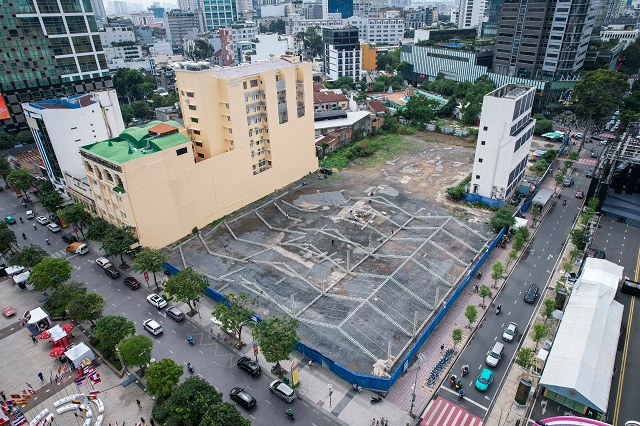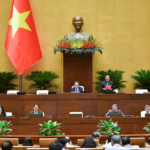
Streamlining the Process of Rearranging and Handling Public Housing and Land: Addressing Challenges and Delays
|
The Ministry of Finance proposes to develop a decree regulating the rearrangement and handling of public assets, specifically housing and land. This decree will replace Decree No. 167/2017/NĐ-CP and Decree No. 67/2021/NĐ-CP, with the aim of refining the legal framework to overcome challenges and obstacles that arise in practice. By doing so, we can expedite the process of rearranging and handling housing and land matters, as well as accelerate the disposal of assets and office spaces of agencies and organizations in administrative units undergoing restructuring, merging, or dissolution.
Expediting the Process and Assigning Provincial People’s Committee Responsibilities
Regarding the procedures for rearranging and handling housing and land (from Article 5 to Article 16), the Ministry of Finance explains that for practical implementation, the draft decree proposes to separate the regulations for inspecting, establishing, and approving plans for centrally and locally managed housing and land into two distinct articles.
The draft decree clearly defines the responsibilities of the Provincial People’s Committee (PPC), which must provide feedback within 30 days from receiving the complete set of documents, including an opinion on whether there are any bases for land retrieval according to land-related laws.
In cases where a ministry or central agency requests feedback on rearrangement plans for multiple housing and land properties (10 or more) or properties with complex origins and usage histories, the PPC may take up to 60 days to respond, provided they inform the requesting ministry or central agency in writing, stating the reasons for the delay.
If the PPC fails to provide a written response within the specified timeframe, the authority responsible for establishing the plan shall submit it to the minister or head of the central agency for approval, as per their authority, or report to the approving authority as stipulated. The requesting ministry or central agency must include the PPC’s response process in their submission. In such cases, the PPC assumes responsibility before the law for matters within their jurisdiction, duties, and local management if the approved plan for rearranging and handling housing and land does not align with legal provisions.
The Ministry of Finance emphasizes that this proposed regulation aims to expedite the process of rearranging and handling housing and land for ministries and central agencies while holding the PPC accountable.
Additionally, the draft decree suggests the following enhancements:
(i) Clearly defining the responsibilities of agencies, organizations, and units managing and utilizing housing and land. They are accountable for the accuracy and completeness of declared information, legal documents, and other relevant records used in compiling, establishing, and approving plans for rearranging and handling housing and land. The supervising agency (the compiling agency) is responsible for ensuring the plan’s compliance, scrutinizing legal documents, and verifying the accuracy and completeness of the declared information (Article 5, Clause 2);
(ii) Standardizing the content of documents submitted to the PPC (where the housing and land are located) for feedback, as well as the content of documents requesting approval of the plan and the key elements of the approval document. This ensures consistency in implementation and assigns clear responsibilities to agencies, organizations, and units at each stage of reporting, declaring, proposing plans, compiling plans, inspecting, providing feedback, approving plans, and issuing handling decisions;
(iii) Establishing a uniform format for the document approving the rearrangement plan as an administrative decision.
Based on the approved plan for rearranging housing and land, the competent authority shall issue an administrative decision for handling the housing and land. A single decision may cover one or multiple housing and land properties.
To reduce administrative procedures, the Ministry of Finance proposes the following in the draft decree:
(i) Eliminating the need for an administrative decision for properties that will be retained for continued use or temporarily retained for continued use;
(ii) Allowing the authority that approves the rearrangement plan to also issue the administrative decision for handling housing and land simultaneously with the approval decision;
(iii) In cases where the authority approving the rearrangement plan is not the same as the authority deciding on the handling of housing and land, the former shall, within 15 days from the approval of the rearrangement plan, send an official copy of the approval document (along with relevant supporting documents and a copy of the central agency’s document as stipulated) to the latter for the issuance of the handling decision.
Proposed Five Forms of Arranging and Handling Public Housing and Land
Regarding the forms of arranging and handling housing and land, the Ministry of Finance refers to the recently passed Law Amending and Supplementing the Law on Public Asset Management (November 29, 2024). Considering the nature and characteristics of housing and land management, practical implementation experiences, and feedback from ministries, sectors, localities, state corporations, and members of the drafting and editing teams, as well as the appraisal of the Ministry of Justice, the draft decree proposes five forms of arranging and handling housing and land for agencies, organizations, and units (Article 9): 1- Retain for continued use; 2- Retrieve; 3- Transfer; 4- Transfer to local management and handling; 5- Temporarily retain for continued use.
The Ministry of Finance notes that these proposals include some modifications and additions compared to current regulations:
Elimination of the “sale” form for public assets consisting of land and assets attached to the land, in alignment with Law No. 56/2024/QH15. Reason: The sale of public assets, such as office spaces and operational facilities (including land, buildings, and assets attached to the land), is currently carried out simultaneously with the sale of the right to use the land, following the regulations on public asset management. However, the transfer of land use rights (including those related to public assets) should also be executed uniformly according to land-related laws to ensure compliance with land use planning and a consistent approach to determining land prices.
Removal of the form: “Using housing and land to compensate investors in projects implemented under the build-transfer form.” This change aligns with the law on investment in the form of public-private partnerships. For cases where the use of housing and land as compensation for investors in build-transfer projects was approved before this decree takes effect, the transition will follow the regulations on investment in the form of public-private partnerships.
Elimination of the “other forms” provision, which states: “Other forms to be considered and decided by the Prime Minister based on proposals from ministers, heads of central agencies, and People’s Committees of related provinces, with the agreement of the Ministry of Finance, ensuring compliance with relevant legal provisions.” Reason: Each form of arranging and handling housing and land has been defined regarding its scope of application, procedures, and decision-making authority in specific articles. The “other forms” provision in Decree No. 167/2017/NĐ-CP and Decree No. 67/2021/NĐ-CP was intended to address cases that could not be covered by the specified forms, provided they adhered to relevant legal provisions. However, in practice, some ministries, sectors, and localities have proposed handling cases under this provision, even though they fell within the scope of the forms already defined in the aforementioned decrees.
– 08:40 10/01/2025
The Ultimate Guide to Maximizing Your Home and Land Assets
For the first time, Ho Chi Minh City’s budget revenue has surpassed the impressive milestone of 500,000 billion VND, a testament to the city’s economic prowess and a defining moment for Vietnam’s economic powerhouse.
Can Civil Servants Retire Early with Full Pension Benefits After 15 Years of Social Insurance Contributions?
Retirees will not only avoid a reduction in their pension rate, but they will also receive a generous allowance of three months’ average salary for each year they retire early. This means that those who choose to retire before the standard retirement age will not only maintain their financial stability but also receive a significant financial boost.




















